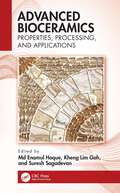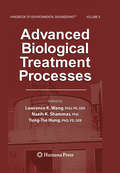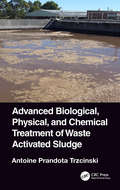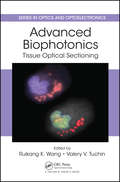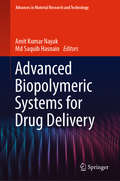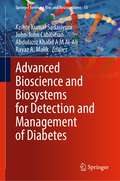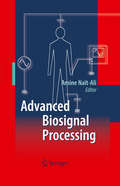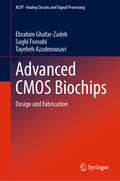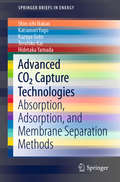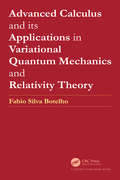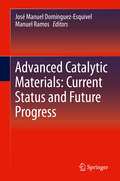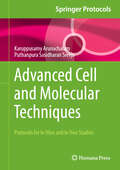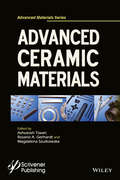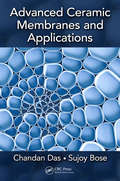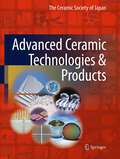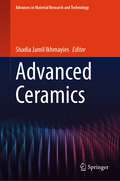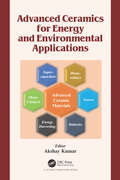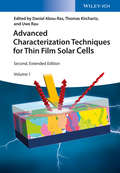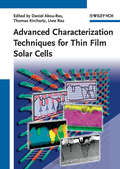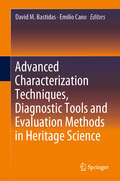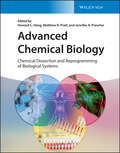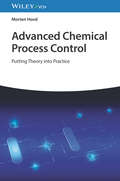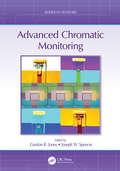- Table View
- List View
Advanced Bioceramics: Properties, Processing, and Applications
by Kheng Lim Goh Md Enamul Hoque Suresh SagadevanAdvanced Bioceramics: Properties, Processing, and Applications describes development of bioceramics and biocomposites, which are used in various biomedical applications including bone tissue repair, remodelling and regeneration. It covers the fundamental aspects of materials science and bioengineering, clinical performance in a variety of applications, ISO/ASTM specifications, and opportunities and challenges. • Offers a comprehensive view of properties and processing of bioceramics. • Highlights applications in dentistry, orthopaedic and maxillofacial implants, and regenerative and tissue engineering. • Covers ISO/ASTM specifications such as processing, clinical applications, recycling/reuse and disposal standards. • Explores health, environmental and ethical issues. With contributions from eminent editors and recognized authors around the world, this book should serve as an important reference for academics, scientists, researchers, students and practitioners in materials science and biomedical engineering. It is to assist in the design of novel, targeted and personalised bioceramic-based solutions to advanced healthcare.
Advanced Biofuels and Bioproducts
by James W. LeeDesigned as a text not only for students and researchers, but anyone interested in green technology, Advanced Biofuels and Bioproducts offers the reader a vast overview of the state-of-the-art in renewable energies. The typical chapter sets out to explain the fundamentals of a new technology as well as providing its context in the greater field. With contributions from nearly 100 leading researchers across the globe, the text serves as an important and timely look into this rapidly expanding field. The 40 chapters that comprise Advanced Biofuels and Bioproducts are handily organized into the following 8 sections: · Introduction and Brazil's biofuel success · Smokeless biomass pyrolysis for advanced biofuels production and global biochar carbon sequestration · Cellulosic Biofuels · Photobiological production of advanced biofuels with synthetic biology · Lipids-based biodiesels · Life-cycle energy and economics analysis · High-value algal products and biomethane · Electrofuels
Advanced Biological Treatment Processes: Volume 9 (Handbook of Environmental Engineering #9)
by Lawrence K. Wang Yung-Tse Hung Nazih K. ShammasVolume 9: Advanced Biological Treatment Processes in the Handbook of Environmental Engineering series provides critical insight into pollution-abatement engineering. This outstanding collection of methodologies is designed as a review of engineering systems currently being used, as well as their potential for use in pollution abatement. The book's expert panel of authors provides a look at a range of topics, including principles and kinetics of biological processes, vertical shaft bioreactors, upflow sludge blanket filtration, membrane bioreactors, column bioreactor, SBR, nitrification, denitrification, and emerging biological processes. Volume 9: Advanced Biological Treatment Processes and its sister book - Volume 8: Biological Treatment Processes - are indispensable as both basic biological treatment textbooks and comprehensive reference books for advanced undergraduate and graduate students, designers of waste treatment systems, scientists, and researchers. A gold-standard addition to The Humana Press series, Volume 9: Advanced Biological Treatment Processes gives readers a cutting-edge illustration of the theory and practice of biological abatement systems and their critical role in environmental issues today.
Advanced Biological, Physical, and Chemical Treatment of Waste Activated Sludge
by Antoine Prandota TrzcinskiRecently, research efforts aiming to improve energy efficiency of wastewater treatment processes for large centralized wastewater treatment plants (WWTPs) have been increasing. Global warming impacts, energy sustainability, and biosolids generation are among several key drivers towards the establishment of energy-efficient WWTPs. WWTPs have been recognized as major contributors of greenhouse gas emissions as these are significant energy consumers in the industrialized world. The quantity of biosolids or excess waste activated sludge produced by WWTP will increase in the future due to population growth and this pose environmental concerns and solid waste disposal issues. Due to limited capacity of landfill sites, more stringent environmental legislation, and air pollution from incineration sites, there is a need to rethink the conventional way of dealing with wastewater and the sludge production that comes with it. This book provides an overview of advanced biological, physical and chemical treatment with the aim of reducing the volume of sewage sludge. Provides a comprehensive list of processes aiming at reducing the volume of sewage sludge and increasing biogas production from waste activated sludge. Includes clear process flowsheet showing how the process is modified compared to the conventional waste activated sludge process. Provides current technologies applied on full scale plant as well as methods still under investigation at laboratory scale. Offers data from pilot scale experience of these processes
Advanced Biophotonics: Tissue Optical Sectioning (Series in Optics and Optoelectronics)
by Valery V. Tuchin Ruikang K. WangDespite a number of books on biophotonics imaging for medical diagnostics and therapy, the field still lacks a comprehensive imaging book that describes state-of-the-art biophotonics imaging approaches intensively developed in recent years. Addressing this shortfall, Advanced Biophotonics: Tissue Optical Sectioning presents contemporary methods and
Advanced Biopolymeric Systems for Drug Delivery (Advances in Material Research and Technology #133)
by Amit Kumar Nayak Md Saquib HasnainThis book discusses the recent innovations in the development of various advanced biopolymeric systems, including gels, in situ gels, hydrogels, interpenetrating polymer networks (IPNs), polyelectrolyte complexes (PECs), graft co-polymers, stimuli-responsive polymers, polymeric nanoparticles, nanocomposites, polymeric micelles, dendrimers, liposomes and scaffolds. It also examines their applications in drug delivery.
Advanced Bioscience and Biosystems for Detection and Management of Diabetes (Springer Series on Bio- and Neurosystems #13)
by Kishor Kumar Sadasivuni John-John Cabibihan Rayaz A. Malik Abdulaziz Khalid A M Al-AliThis book covers the medical condition of diabetic patients, their early symptoms and methods conventionally used for diagnosing and monitoring diabetes. It describes various techniques and technologies used for diabetes detection. The content is built upon moving from regressive technology (invasive) and adapting new-age pain-free technologies (non-invasive), machine learning and artificial intelligence for diabetes monitoring and management. This book details all the popular technologies used in the health care and medical fields for diabetic patients. An entire chapter is dedicated to how the future of this field will be shaping up and the challenges remaining to be conquered. Finally, it shows artificial intelligence and predictions, which can be beneficial for the early detection, dose monitoring and surveillance for patients suffering from diabetes
Advanced Biosignal Processing
by Amine Nait-AliThrough 17 chapters, this book presents the principle of many advanced biosignal processing techniques. After an important chapter introducing the main biosignal properties as well as the most recent acquisition techniques, it highlights five specific parts which build the body of this book. Each part concerns one of the most intensively used biosignals in the clinical routine, namely the Electrocardiogram (ECG), the Elektroenzephalogram (EEG), the Electromyogram (EMG) and the Evoked Potential (EP). In addition, each part gathers a certain number of chapters related to analysis, detection, classification, source separation and feature extraction. These aspects are explored by means of various advanced signal processing approaches, namely wavelets, Empirical Modal Decomposition, Neural networks, Markov models, Metaheuristics as well as hybrid approaches including wavelet networks, and neuro-fuzzy networks. The last part, concerns the Multimodal Biosignal processing, in which we present two different chapters related to the biomedical compression and the data fusion. Instead organising the chapters by approaches, the present book has been voluntarily structured according to signal categories (ECG, EEG, EMG, EP). This helps the reader, interested in a specific field, to assimilate easily the techniques dedicated to a given class of biosignals. Furthermore, most of signals used for illustration purpose in this book can be downloaded from the Medical Database for the Evaluation of Image and Signal Processing Algorithm. These materials assist considerably the user in evaluating the performances of their developed algorithms. This book is suited for final year graduate students, engineers and researchers in biomedical engineering and practicing engineers in biomedical science and medical physics.
Advanced CMOS Biochips: Design and Fabrication (Analog Circuits and Signal Processing)
by Ebrahim Ghafar-Zadeh Saghi Forouhi Tayebeh AzadmousaviBiochips incorporate a verity of means including electronic, photonic and microfluidic devices; biological materials (living cells, tissue, enzymes, nucleic acid and etc.) and chemical analysis to produce the detectable signals for identification of biological phenomena. Among several competing biochip technologies, Complementary Metal Oxide Semiconductor (CMOS) process offers the advantages of low cost, integrated, high precision and portable techniques suitable for point-of-care diagnostics. Advanced CMOS Biochip takes multi-path approach: microelectronic design and implementation of bio-interfaces offering a vital contemporary view of a wide range of integrated circuits and system for electrical, magnetic, optical and mechanical sensing and actuating blocks and much more; classical knowledge of biology, biochemistry as well as microfluidics. The coverage is both practical and in depth integrating experimental, theoretical and simulation examples. By using Advanced CMOS Biochip, readers will have the fundamentals and design techniques to grasp the situation which arise typically in CMOS biochip devices.
Advanced CO2 Capture Technologies: Absorption, Adsorption, and Membrane Separation Methods (SpringerBriefs in Energy)
by Shin-ichi Nakao Katsunori Yogo Kazuya Goto Teruhiko Kai Hidetaka YamadaThis book summarises the advanced CO2 capture technologies that can be used to reduce greenhouse gas emissions, especially those from large-scale sources, such as power-generation and steel-making plants. Focusing on the fundamental chemistry and chemical processes, as well as advanced technologies, including absorption and adsorption, it also discusses other aspects of the major CO2 capture methods: membrane separation; the basic chemistry and process for CO2 capture; the development of materials and processes; and practical applications, based on the authors’ R&D experience. This book serves as a valuable reference resource for researchers, teachers and students interested in CO2 problems, providing essential information on how to capture CO2 from various types of gases efficiently. It is also of interest to practitioners and academics, as it discusses the performance of the latest technologies applied in large-scale emission sources.
Advanced Calculus and its Applications in Variational Quantum Mechanics and Relativity Theory
by Fabio Silva BotelhoThe first part of this book reviews some key topics on multi-variable advanced calculus. The approach presented includes detailed and rigorous studies on surfaces in Rn which comprises items such as differential forms and an abstract version of the Stokes Theorem in Rn. The conclusion section introduces readers to Riemannian geometry, which is used in the subsequent chapters. The second part reviews applications, specifically in variational quantum mechanics and relativity theory. Topics such as a variational formulation for the relativistic Klein-Gordon equation, the derivation of a variational formulation for relativistic mechanics firstly through (semi)-Riemannian geometry are covered. The second part has a more general context. It includes fundamentals of differential geometry. The later chapters describe a new interpretation for the Bohr atomic model through a semi-classical approach. The book concludes with a classical description of the radiating cavity model in quantum mechanics.
Advanced Catalytic Materials: Current Status and Future Progress
by José Manuel Domínguez-Esquivel Manuel RamosThis book presents advances in computational methods, experimental synthesis, and advanced characterizations for novel catalytic materials. The authors show how catalytical materials can be used for various engineering oil & gas applications – mainly in low contaminants fuel production. All contributors, describe in detail novel experimental and theoretical techniques techniques and concepts for synthesis, evaluation and scaling catalytic materials and research advances in evaluation, extensive characterization and theoretical modeling using computer assisted methods and algorithms.Describes computational methods, experimental synthesis and advanced characterization for novel catalytic materials;Examines catalytic materials and corresponding engineering applications with a focus on low contaminant fuel production and derivatives;Covers the application of computer assisted quantum mechanical for fundamental understanding of electronic structure of molecular dimension catalytic materials.
Advanced Cell and Molecular Techniques: Protocols for In Vitro and In Vivo Studies (Springer Protocols Handbooks)
by Karuppusamy Arunachalam Puthanpura Sasidharan SreejaThis detailed volume explores laboratory protocols and methodologies for studying cell cultures, genetic analysis, and various biochemical assays. The chapters within this book cover a wide range of techniques, from basic cell culture methods to more specialized assays used in the study of genotoxicity, apoptosis, and gene expression, not only relevant to academic researchers but also to professionals in the pharmaceutical, biotechnological, and clinical fields. Written for the Springer Protocols Handbooks series, each protocol has been carefully compiled to provide step-by-step instructions, ensuring clarity and reproducibility. Authoritative and practical, Advanced Cell and Molecular Techniques: Protocols for In Vitro and In Vivo Studies serves as both a hands-on guide and a source of inspiration for future research as the fields of molecular biology and toxicology continue to evolve.
Advanced Ceramic Materials
by Ashutosh Tiwari Magdalena Szutkowska Rosario A. GerhardtCeramic materials are inorganic and non-metallic porcelains, tiles, enamels, cements, glasses and refractory bricks. Today, "ceramics" has gained a wider meaning as a new generation of materials influence on our lives; electronics, computers, communications, aerospace and other industries rely on a number of their uses. In general, advanced ceramic materials include electro-ceramics, optoelectronic-ceramics, superconductive ceramics and the more recent development of piezoelectric and dielectric ceramics. They can be considered for their features including mechanical properties, decorative textures, environmental uses, energy applications, as well as their usage in bio-ceramics, composites, functionally graded materials, intelligent ceramics and so on. Advanced Ceramic Materials brings together a group of subject matter experts who describe innovative methodologies and strategies adopted in the research and development of the advanced ceramic materials. The book is written for readers from diverse backgrounds across chemistry, physics, materials science and engineering, medical science, pharmacy, environmental technology, biotechnology, and biomedical engineering. It offers a comprehensive view of cutting-edge research on ceramic materials and technologies. Divided into 3 parts concerning design, composites and functionality, the topics discussed include: Chemical strategies of epitaxial oxide ceramics nanomaterials Biphasic, triphasic and multiphasic calcium orthophosphates Microwave assisted processing of advanced ceramic composites Continuous fiber reinforced ceramic matrix composites Yytria and magnesia doped alumina ceramic Oxidation induced crack healing SWCNTs vs MWCNTs reinforcement agents Organic and inorganic wastes in clay brick production Functional tantalum oxides Application of silver tin research on hydroxyapatite
Advanced Ceramic Membranes and Applications
by Chandan Das Sujoy BoseThis book provides a balanced blend of fundamental concepts of fabrication, characterization of conventional ceramics, extending to present the recent advances in ceramic membranes. It covers the basic concepts of ceramic membranes as well as practical and theoretical knowledge in conventional and advanced ceramic membranes combined with unorthodox ideas for novel approaches in ceramic membranes. Book includes lot of real time examples derived largely from research work by authors. Aimed at researchers, students and academics in the field of membrane engineering around the globe, it has following key features: Guides readers through manufacturing, characterizing and using low-cost ceramic technology. Provides an overview of the different types of ceramic membranes, catalytic reactors and their uses. Covers industrial application, separation and purification. Includes recent developments and advances in membrane fabrication. Discusses new raw materials for ceramic membranes.
Advanced Ceramic Technologies & Products
by The Ceramic Society of JapanSince the last century, ceramics have become essential to modern society and our daily lives. They have become an indispensable product to many industries, especially within the fields of electronics, automobiles, medicine, and leisure. Japanese ceramic technologies and products are highly sophisticated and world renown, and ceramic products have long contributed to Japanese society. The true significance of ceramics to modern society however, is not well understood. This book describes in detail the background to and objective of the development, materials, manufacturing processes, functions and future prospects of a number of ceramic products. Not merely about the science and technology of ceramic manufacturing, the book is about the products themselves, as it tries to clarify how ceramics continue to contribute to our lives. It is the first such work to show advanced ceramic products in detail, from the technologies used to their application, and can be seen as a kind of illustrated reference book for modern advanced ceramic products as it is filled with easy-to-understand illustrations and photos. By including past and current product technologies, the editors hope the book will serve to guide engineers and the manufacturing sector toward a bright future of innovations for the benefit of us all.
Advanced Ceramics (Advances in Material Research and Technology)
by Shadia Jamil IkhmayiesThis book presents the fundamentals of advanced ceramics, their stages of development, types and classifications, advanced processing techniques, properties, sintering, and new forms of applications. It highlights specific examples such as alumina, zirconia, Mg-Al-spinels, silicon carbide, silicon nitride, ceramic composites, and thin films with their specific applications. The book reviews progress in perovskite ceramics, in which the synthesis, processing, characterization, and advanced applications of perovskite ceramics are all thoroughly discussed. In addition, developments of perovskite solar cells, the main factors affecting their stability, current problems, development prospects in the research, and application of perovskite solar cells are all highlighted. This book also includes a review of a particular class of rare-earth-based mixed-metal oxides, namely Ln2B2O7 nanostructures (B = Zr, Sn, and Ce), where advantages and disadvantages of each production technique are addressed along with the properties of as-produced nanostructures. The solar photocatalytic uses of Ln2B2O7 nanostructures such as photodegradation of contaminants are also discussed. Yttria-based transparent ceramics for photonic applications are reviewed, along with a discussion of powder synthesis, green body preparation, sintering, and optical properties. In addition, the fundamentals of electrophoretic deposition of hydroxyapatite incorporated composite coatings on metallic substrates are presented and discussed. The different types of ceramics-based self-healing coatings and their fabrication processes have also been reported and discussed in this book. These include titania, zirconia, titanium-alumina, and zirconia-alumina incorporated with Benzotriazole (BTA) as an inhibitor. Advanced ceramic materials that have been used for the purpose of wastewater treatment including ceramic sorbents, resins, aerosols, and ceramic membranes that have been widely used for wastewater treatment purposes are also discussed in depth.Moreover, the book presents the preparation of geopolymers by microwave treatments and explains how their properties can be tuned using microwaves. Furthermore, the future and perspective of these advanced ceramic materials and their modifications to ensure better efficacy toward environmental remediation purposes are highlighted in this book.
Advanced Ceramics for Energy and Environmental Applications
by Akshay KumarAdvanced Ceramics possess various unique properties and are able to withstand harsh environments. The aim of this book is to cover various aspects of the advanced ceramics like carbides, nitrides and oxides for energy and environment related applications. Advanced ceramics with additional functionality propose significant potential for greater impact in the field of energy and environmental technologies. This book focuses on the nanostructured ceramics synthesis, properties, structure-property relation and application in the area of energy and environment. It covers the high impact work from around 50 leading researchers throughout the world working in this field. This will help metallurgists, biologists, mechanical engineers, ceramicists, material scientists and researchers working in the nanotechnology field with inclusion of every aspect of advanced ceramics for energy and environmental applications.
Advanced Characterization Techniques for Thin Film Solar Cells
by Daniel Abou-Ras Uwe Rau Thomas KirchartzThe book focuses on advanced characterization methods for thin-film solar cells that have proven their relevance both for academic and corporate photovoltaic research and development. After an introduction to thin-film photovoltaics, highly experienced experts report on device and materials characterization methods such as electroluminescence analysis, capacitance spectroscopy, and various microscopy methods. In the final part of the book simulation techniques are presented which are used for ab-initio calculations of relevant semiconductors and for device simulations in 1D, 2D and 3D. Building on a proven concept, this new edition also covers thermography, transient optoelectronic methods, and absorption and photocurrent spectroscopy.
Advanced Characterization Techniques for Thin Film Solar Cells
by Daniel Abou-Ras Uwe Rau Thomas KirchartzWritten by scientists from leading institutes in Germany, USA and Spain who use these techniques as the core of their scientific work and who have a precise idea of what is relevant for photovoltaic devices, this text contains concise and comprehensive lecture-like chapters on specific research methods. They focus on emerging, specialized techniques that are new to the field of photovoltaics yet have a proven relevance. However, since new methods need to be judged according to their implications for photovoltaic devices, a clear introductory chapter describes the basic physics of thin-film solar cells and modules, providing a guide to the specific advantages that are offered by each individual method. The choice of subjects is a representative cross-section of those methods enjoying a high degree of visibility in recent scientific literature. Furthermore, they deal with specific device-related topics and include a selection of material and surface/interface analysis methods that have recently proven their relevance. Finally, simulation techniques are presented that are used for ab-initio calculations of relevant semiconductors and for device simulations in 1D and 2D. For students in physics, solid state physicists, materials scientists, PhD students in material sciences, materials institutes, semiconductor physicists, and those working in the semiconductor industry, as well as being suitable as supplementary reading in related courses.
Advanced Characterization Techniques, Diagnostic Tools and Evaluation Methods in Heritage Science
by David M. Bastidas Emilio CanoThis book details the application of advanced characterisation techniques and diagnostic tools to heritage science, including the evaluation of heritage assets’ condition, their preservation and restoration. <p><p> It examines the use of electrochemical techniques in conservation science, with a particular focus on how to solve problems in taking on-site measurements. Specifically, it introduces readers to a new gel polymer (GPE) electrochemical cell developed by the authors for the characterisation of metallic heritage objects. Other techniques used to characterise and monitor reinforced concrete objects in more modern buildings are also covered, including non-destructive electrochemical techniques that allow steel corrosion to be assessed in these structures, and in those that are used to protect and repair such buildings. <p> The usefulness of the NMR-Mouse nuclear magnetic resonance sensor in the assessment and preservation of softer heritage materials, such as wood, parchment, bone, and painted walls, is covered, as well as Infrared reflectography for examining paintings and laser cleaning for restoring them. The book introduces ultra-High Performance Liquid Chromatography (u-HPLC) with a diode-array (DAD) and mass–mass (MS-MS) quadruple time-of-flight spectroscopy (QTOF). This new technique can be applied to the analysis and identification of natural and synthetic organic pigments and its use is demonstrated in several case studies. <p> This book provides a rigorous scientific grounding in the application of state-of-the-art techniques in heritage science and conservation, and offers a practical handbook for practitioners.
Advanced Chemical Biology: Chemical Dissection and Reprogramming of Biological Systems
by Howard HangAdvanced Chemical Biology The modern approach to teaching chemical biology Advanced Chemical Biology is organized around the central dogma of life, progressing from genes to proteins and higher-order cellular structures, including core application areas such as imaging, chemical genetics, activity-based protein profiling, and natural product discovery and biosynthesis. Advanced topics and applications in, e. g., microbiology, developmental biology, and neurobiology, are covered in separate sections. Every chapter is homogeneous in style and layout, consisting of a short historical introduction followed by a description of the underlying concepts and a selection of recent examples of how the concept has been turned into practice. The subdivision of the contents into core and supplemental chapters enables a flexible use in teaching, both for a one-semester and a two-semester course. Written by authors and editors coming from the leading scientific institutions that have developed the concepts and technologies for this discipline, Advanced Chemical Biology includes specific information on topics like: DNA function, synthesis and engineering, chemical approaches to genome integrity, and RNA function, synthesis, and probing Chemical approaches to transcription and RNA regulation in vivo, chemical biology of genome engineering, and peptide/protein synthesis and engineering Directed evolution for chemical biology, chemical biology of cellular metabolism, chemical biology of lipids, and protein post-translational modifications Chemical glycobiology, chemical and enzymatic modification of proteins, genetic code expansion, bio-orthogonal chemistry, and cellular imaging With its broad scope and focus on turning concepts into applications, Advanced Chemical Biology is an excellent starting point for anyone entering the field and looking for a guide to the wide range of available methods and strategies that chemical biology has to offer. With a Foreword by Nobel Laureate Carolyn Bertozzi.
Advanced Chemical Process Control: Putting Theory into Practice
by Morten HovdAdvanced Chemical Process Control Bridge the gap between theory and practice with this accessible guide Process control is an area of study which seeks to optimize industrial processes, applying different strategies and technologies as required to navigate the variety of processes and their many potential challenges. Though the body of chemical process control theory is robust, it is only in recent decades that it has been effectively integrated with industrial practice to form a flexible toolkit. The need for a guide to this integration of theory and practice has therefore never been more urgent. Advanced Chemical Process Control meets this need, making advanced chemical process control accessible and useful to chemical engineers with little grounding in the theoretical principles of the subject. It provides a basic introduction to the background and mathematics of control theory, before turning to the implementation of control principles in industrial contexts. The result is a bridge between the insights of control theory and the needs of engineers in plants, factories, research facilities, and beyond. Advanced Chemical Process Control readers will also find: Detailed overview of Control Performance Monitoring (CPM), Model Predictive Control (MPC), and more Discussion of the cost benefit analysis of improved control in particular jobs Authored by a leading international expert on chemical process control Advanced Chemical Process Control is essential for chemical and process engineers looking to develop a working knowledge of process control, as well as for students and graduates entering the chemical process control field.
Advanced Chemistry in Creation (2nd Edition)
by Jay L. WileYou are about to embark upon an amazing journey! In this text, you will take a deep look at the fascinating subject of chemistry. You will learn about the matter that makes up God's creation and how it changes. Although this course will be hard work, you will learn some truly incredible things.
Advanced Chromatic Monitoring (Series in Sensors)
by Gordon R. Jones and Joseph W. SpencerAdvanced Chromatic Monitoring provides a major source of information about the novel approach of chromaticity with examples of how chromaticity may be deployed for various monitoring applications. It shows with examples what can be achieved with chromatic methods in producing relevant information with a variety of test techniques and in facilitating the interpretation of complex data about complicated situations. It will be of interest to postgraduates and researchers in a wide breadth of physical disciplines (engineering, medicine, environmental sciences) and those involved with data acquisition and analysis. Key Features: Applicable to a wide range of disciplines (engineering, medical, environmental, etc) and those interested in science, technology, data acquisition and analysis Provides an extrapolation of new knowledge well beyond that covered in existing literature with regard to dealing with complicated forms and sets of data Addresses inspiring and innovative areas of research including environmental, power delivery and medical monitoring About the Editors: Emeritus Professor Gordon R. Jones – founder and former Director of the Centre for Intelligent Monitoring Systems (CIMS), former Head of the Department of Electrical Engineering and Electronics, and former Director of Electric Arcs Research Group at the University of Liverpool. He was awarded the IEEE Education, Science and Technology Achievement Medal (1999). Professor Joe W. Spencer – the present Director of CIMS at the University of Liverpool, having been Head of the Department of Electrical Engineering and Electronics at Liverpool. He is involved in operating a multi-million pound technology transfer unit (Sensor City, Liverpool) with whose establishment he played a major role and with which CIMS has major interactions.
